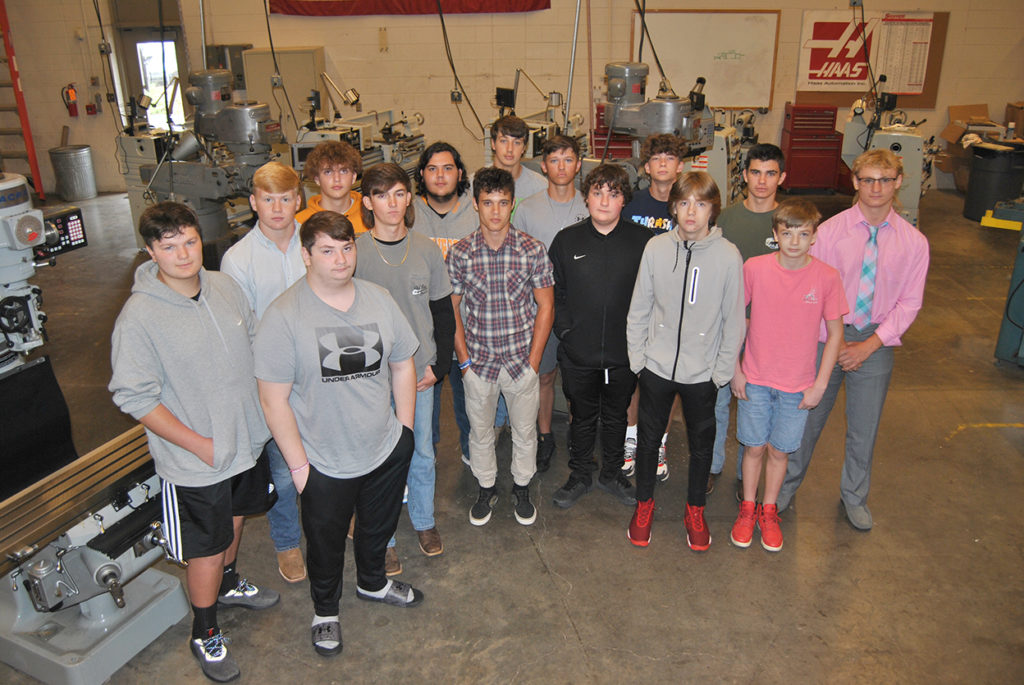
By Dave Ongie
In this age of political division, finding issues red states and blue states can agree on may seem impossible.
But when it comes to Tennessee and Massachusetts, the role of vocational technical education in developing a robust, well-trained workforce is an area with plenty of potential overlap. Massachusetts has a proud history of vocational education that extends back over 100 years, and in the last 30 or so, the state has developed a network of public vocational-technical high schools that is considered to be a model for the nation.
In Tennessee, Governor Bill Lee has made vocational and technical education a central focus of his first term in Nashville. Lee’s first legislative initiative when he took office was the Governor’s Investment in Vocational Education (GIVE), which aimed to provide communities the funding and flexibility to build internship opportunities and vocational and technical training programs that reflect local needs.
Lee has also worked to increase access to career and technical schools for Tennesseans, including a $79 million investment designed to address the waiting list at TCAT locations across the state.
Chris Sinacola – co-editor of a book entitled Hands-on Achievement that chronicles the policies that have made Massachusetts a national model for voc-tech education – says his experience talking with people across the political spectrum offer evidence that the importance of workforce development is something most people can agree on.
“Whether they were left, right or center, when you get down to the things you agreed on, it was always stuff about the economy – workforce training, education, apple pie, baseball,” Sinacola said with a chuckle. “You don’t need to have a fight on every one of these issues.”
As Tennessee continues to focus on creating the workforce of tomorrow, the Volunteer State might consider taking a page or two out of the Bay State’s playbook.
Reimagine the current secondary school model
Voc-tech education in Massachusetts can trace its roots back to 1906 when the state’s governor – a shoe manufacturer – passed the first legislation establishing industrial schools in the state. Sputnik and the rise of the computer age in the middle of the 20th Century led to changes in the state’s voc-tech schools, but the real evolution took place in 1993 when sweeping education reform legislation was passed.
Sinacola said the two main things the legislation did was to establish charter public schools in the state and subjected voc-tech school graduates to the same testing requirements that were imposed on all students, requiring them to pass comprehensive tests called MCATs.
“Thirty years later, (voc-tech schools) have moved from being schools that were considered somewhere that other people’s kids would go, kids that weren’t as academically gifted, perhaps, to being schools of real choice, the premiere high schools in the state,” Sinacola said.
The proof of the success of voc-tech schools can be found in both testing results and dropout rates. Students who make the decision to attend voc-tech schools in Massachusetts have actually started outperforming students who attend comprehensive high schools despite the fact they spend half as much time in the traditional academic setting.
Students who attend voc-tech schools alternate between a week learning their trade in a shop setting and a week in the classroom. Sinacola believes the high academic performance in this 50-50 model can be attributed partially to the chance to apply academic concepts to real-world problems the students encounter in their chosen trade. He also believe students who have an end goal in mind and develop a bond with their instructors are more prone to academic success.
The dropout rate at voc-tech schools offers more evidence the process is working. Overall, Massachusetts has a high school dropout rate of 1.8 percent – well below the national average – but the dropout rate in voc-tech schools is a third of that at 0.6 percent.
Engage the private sector in the educational process
Worcester is the second-largest city in Massachusetts, but Boys Trade High School – the longstanding voc-tech school in town – was rundown, tired and in a bad location. Instead of the city taking on debt to build a new school, the business community stepped up and raised $30 million to build a new campus in a vibrant part of town next to a park.
By 2014, President Obama was at the newly minted Worcester Tech speaking during the school’s graduation exercises describing the school as a “model for the nation.”
“Along with that, they drove down the dropout rates and improved graduation rates, which are really the envy of schools not only elsewhere in the country, but regular high schools in Massachusetts,” Sinacola said. “They look at that and say, ‘I wish we could do that.’ ”
That type of financial investment illustrates the strong bond between the voc-tech schools in the state and the employers that rely on those schools for their workforce. Each of the 45 disciplines in each school has an advisory council, and members of the business community are on those councils to help shape the curriculum in the shops that train students. Sinacola said the purpose of that is to keep faculty up-to-date on the latest information in the field to ensure graduates are ready to make a seamless transition into the workforce.
When students in the voc-tech schools in Massachusetts reach their senior year, they enter into a co-op program with a local employer in order to put their training to the test. Sinacola said many of the students end up being hired by the employer who offered them the co-op experience.
“They may go directly from graduation to their job the next week, or maybe have a short break,” he said.
Give voc-tech schools the autonomy they need to succeed
When you look across the state of Massachusetts, there isn’t a one-size-fits-all approach to voc-tech schools.
There are some communities that opt to put vocational programs in comprehensive schools while other communities, towns and cities band together to form a regional voc-tech school. Sinacola said each region has the freedom to set its own budget and offer programs as they see fit.
“That allows them to pretty much decide what programs they want to offer and which programs they want to retire,” he said, adding that programs like Homemaking that were popular in the 1950s have given way to more STEM and technology-based offerings.
As time goes on, schools start to take the shape of their unique regions. For example, some rural areas in Massachusetts offer veterinary medicine and farming options not found in more urban areas. Conversely, Pioneer Valley features an aviation cluster that provides students with FAA airframe training and a regional school in the Berkshire Hills offers plastics-centric trades including injection molding.
“There are different industries in different sectors of the state, and the schools will reflect that as well,” Sinacola said. “That obviously helps those industries because they know what the need to support, where they need to put their money, their in-kind donations, training equipment and co-op programs.”
Echoes of that concept are appearing in Tennessee already as Gov. Lee announced a year ago that a new TCAT campus would be placed on the Memphis Regional Megasite to help train workers for the massive Ford plant being constructed in that part of the state.
It is not hard to imagine similar TCAT programs being shaped by Eastman and Aerospace Park in our area. Moreover, with talk of a “Middle College” route that will allow high school students to earn certifications and their high school diplomas concurrently, integrating elements of the Massachusetts approach into Tennessee may not be as farfetched as it once was.
Sure, workers in Massachusetts may be likely to work in union shops while Tennessee’s Right to Work legislation could very well be enshrined in the state constitution this November. But Sinacola said that in his experience, workforce development is a cause that transcends political differences.
“Unless you have those trained workers going (into the workforce), the rest of it doesn’t matter a whole lot,” he said. “You can say, ‘Well, this is a union shop,’ but if nobody is coming in to put on the tool belt to work for you, you’re not going to have a business. I think everyone has come together on that. It’s refreshing.”




